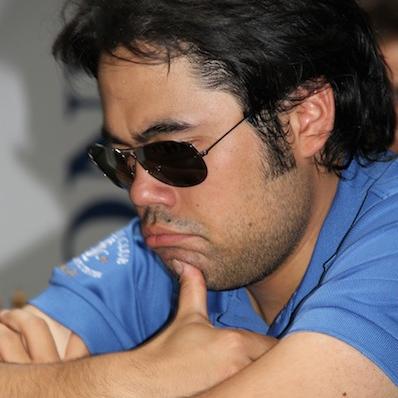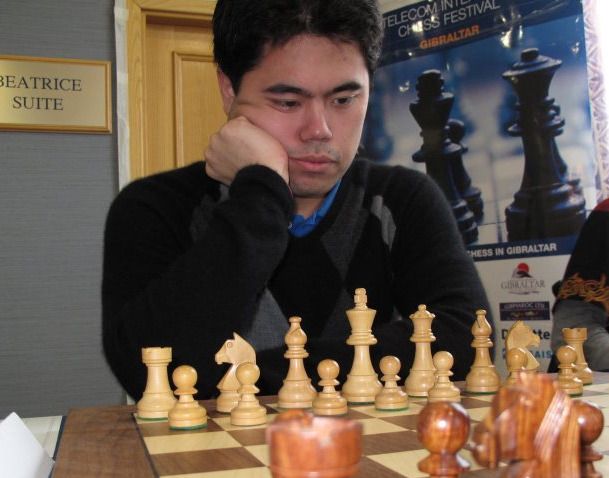
Hikaru Nakamura: Rise of the Machines, the Conclusion
In the first part of this article, we left our Chess Terminator playing countless blitz and bullet games during the last free day of the championship. In the following seventh round, Nakamura had a very tough opponent.
By the way, this is a good moment to address one of the reader questions asked in the comments. Sakurei asked:
"How did they not expect Nakamura to win when all his opponents (that were shown here) are all rated lower than he is?"
You should remember that it was a Swiss tournament with 64 participants. Traditionally strong chess players face other strong chess players towards the end of the tournament (providing they played well against weaker opponents in the beginning). So, even though Nakamura wasn't a top-seeded player, you could have an impression that he was number one by rating because all his opponents in the first six rounds were lower rated.
It changed in the seventh round since Hikaru finally played a higher rated opponent. GM Gregory Kaidanov has been consistently among the U.S. chess elite for about 20 years, and yet he never won the title!

via chess.com
In this tournament, he was one of the favorites, that is before the following game was played! Here is what Nakamura said about their encounter:
"Before the game against Kaidanov, I was thinking just don't lose, play solidly...So far, Kaidanov had been playing pretty well, but in this game he didn't seem prepared for the Grunfeld."
Round 8:
This is a puzzling game. Playing against another pre-tournament favorite, Nakamura chose the line well known in the opening theory -- a line that doesn't promise White anything at all. Soon, Hikaru had to find accurate moves to keep the position equal, but at the end he managed to make a draw.
This is probably one of the most boring games Nakamura ever played! I fail to understand why Nakamura chose the line that doesn't offer White any advantage, and besides, doesn't fit his energetic style of play.
Round 9:
As much as the previous game was boring, this game is a piece of chess art. Just don't expect a flawless game where the logic and calculations of one chess player were superior.
In my opinion, despite the numerous mistakes, both players desrve a praise for their play in this tense, all-important, last-round game. And with so many twists, it was a fun game to watch. To appreciate how difficult it was to play this game, I offer you to find a solution in a couple of positions from the game. Can you calculate better than the best U.S. players?
Yes, here Ibragimov missed a good opportunity to win the game. Was it easy for you to find? I remember that I joined a group of three or four grandmasters, and we discussed this position and found the whole line.
But unlike Nakamura and Ibragimov, we weren't under tremendous pressure, we weren't in a time trouble (and both players had no more than 15 minutes each at that moment), and don't forget that there were three or four of us exchnaging our ideas about the position -- meanwhile the players could rely only on themselves!
Did Nakamura see this variation? Of course he did, it is too simple for a strong grandmaster. But by that time it became clear that in order to fight for the title, Nakamura had to win this game, so he took enourmous risk that could backfire!
As you can see, Ibragimov was pretty much just one move from winning the game, but what a move! After Black's miss, Nakamura finished the game pretty convincingly:
As the result of the dramatic last round, GMs Nakamura and Stripunsky tied for the first place, and a playoff was scheduled for the following day.
Even 10 years ago Nakamura was already the unofficial king of speed chess, so he confirmed his reputation by winning both games relatively easily.
And the new U.S. champion was crowned! By today's standard, Nakamura's winner's check for $25,000 was relatively modest, but I bet it was an enormous amount for a 16-year-old.
Now it was time to get some rest after the gruelling tournament, but as we know Terminators need no rest, and in about a week Nakamura was playing a 6-game match vs. the rising star of Russian chess: Sergey Karjakin.
Even though Karjakin lost the match (1.5 -4.5), in my opinion he shouldn't complain much, since while looking at the games I had a strong impression that the score could have been even worse for him.
I have to confess at that point I was absolutely sure that we were witnessing the rise of the next world champion. After all, didn't Tal win the world title just three years after winning the Soviet Championship?
And unlike Tal, Nakamura was just 17 and already convincingly beat his potential future rival (Karjakin). There are many reasons why it didn't happen (and anticipating your guess, Magnus Carlsen is not the main reason!).
I am not going to discuss these reasons here, since Hikaru knows them better than anyone else. I will just repeat the words of Mikhail Botvinnik about another American prodigy -- Bobby Fischer.
Botvinnik, the patriarch said:
"If he doesn't become the world champion by the age 30, he will never be the world champion!"
Fischer managed to beat the clock and became the world champion at the age of 29!
These days, competition at the chess summit is fiercer than ever, and the chess elite is getting younger and younger.
Therefore, our Terminator's clock is ticking...
RELATED STUDY MATERIAL
- Check out GM Serper's last article on Hikaru Nakamura.
- Watch GM Hikaru Nakamura play bullet in "Nakamura's Knockouts!"
- Follow GM Nakamura later this month in the Sinquefield Cup at Chess.com/news.
- Hikaru plays tactics like a machine. Learn how to yourself in the Tactics Trainer.
- Looking for articles with deeper analysis? Try our magazine: The Master's Bulletin.



